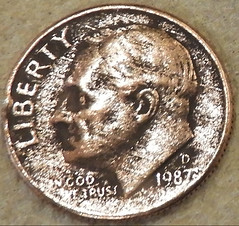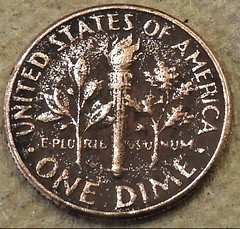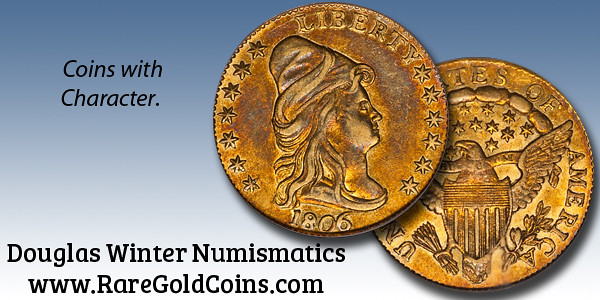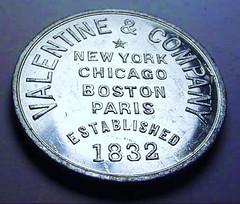
PREV ARTICLE
NEXT ARTICLE
FULL ISSUE
PREV FULL ISSUE
NOTES FROM E-SYLUM READERS: DECEMBER 30, 2018On Bimetallic Tokens I have to take exception to the statement in the Vocabulary Term: Bimetallic article in the sub-heading Bimetallic Tokens. The usual scenario is an aluminum center with a brass outer ring, not the other way around. The arrangement as stated is true for encased cents, etc. but not for tokens. And, the Schenkman book is a true book, not a list. Dave states that there are "numerous exceptions" to the convention of having a harder metal for the outer ring (to reduce wear), but posits that they were made in an effort to circumvent the George G. Greenburg patent of 1899. Thank you. Patents and patent avoidance make for some otherwise hard-to-understand choices. Interesting possibility. -Editor To read the earlier E-Sylum article, see: More on Valentine Varnishes Tokens
Thanks. That would make for an interesting collection. -Editor To read the earlier E-Sylum article, see: Query: A Clad Dime Minus Its Cladding?   Nick Graver writes: Here are pictures of a 1987-D dime that appears to be struck on an 'un-clad' planchet, lacking the top and bottom of the usual sandwich. The piece is very rough and porous and much lighter than usual. Puzzling are a number of horizontal 'ridge' raised lines that may have been caused by scratches into the obverse striking die. Bruce Tyo of Rochester, NY found it and offers it for your readers' pleasure. Frank Calandra of Webster, NY deserves photo credit for the images. What is misleading is the pictures show the coin as a silvery color, but it is actually a coppery warm tone. This is not an area I'm familiar with, but if the coin is copper colored and much lighter than normal that's consistent with the theory that the coin is lacking its outer layers. What do readers think? -Editor Query: Columbia & Washington Medal Ship In researching the Columbia & Washington medal, I find there are conflicting statements as to the place and time of the Columbia's construction. Various sources, including the Ford V catalog, give the location and date as 1773 in Marshfield, Massachusetts. Frederic Howay cites two registers of the Columbia found in the National Archives that indicate the ship was constructed in Plymouth, Massachusetts in 1787. Can anyone shed any light on these conflicting sources? Could these be different ships with the same name? Good question. Can anyone help? -Editor Trump Slogan Stamped on $20 Bill We've often discussed circulating banknotes with political slogans on them, such as the following, submitted by Gary Beals. A reader had mentioned the existence of these stamps, but this is the first image we've had of a stamped note. -Editor  To read the earlier E-Sylum articles, see:  Wayne Homren, Editor The Numismatic Bibliomania Society is a non-profit organization promoting numismatic literature. See our web site at coinbooks.org. To submit items for publication in The E-Sylum, write to the Editor at this address: whomren@gmail.com To subscribe go to: https://my.binhost.com/lists/listinfo/esylum All Rights Reserved. NBS Home Page Contact the NBS webmaster 
|
